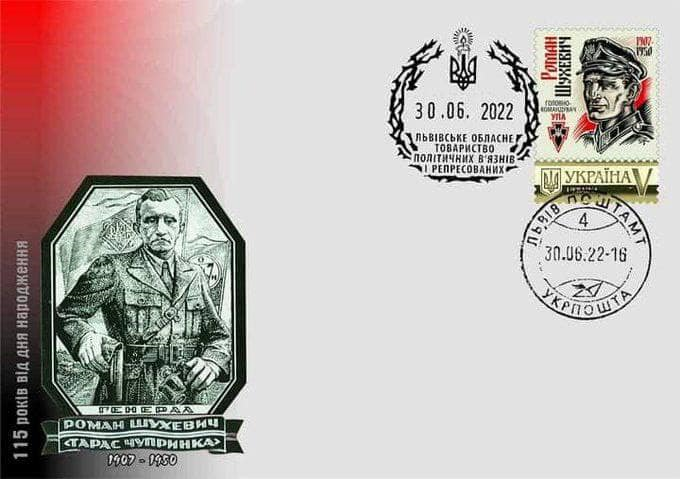More disinformation on Ukraine: How fake news about a Shukhevych stamp went viral

This image, which depicts a Ukrainian stamp marking the 30 June birthday of notorious World War 2 Nazi collaborator Roman Shukhevych, recently went viral on social media. It followed immediately after the controversy over Ukraine’s ambassador to Germany, Andriy Melnyk, and his defence of Shukhevych’s fellow fascist Stepan Bandera, which the Ukrainian government excused on the basis that this was just Melnyk’s personal opinion and did not reflect the official view.
Although it is unclear where he got it from, the image was discovered by a rightwing Polish priest named Tadeusz Isakowicz-Zaleski, who took to twitter on 4 July to angrily denounce this celebration of a genocidal anti-Polish ethnonationalist, and called on his country’s foreign ministry to issue a statement of condemnation. Isakowicz-Zaleski evidently saw this as a “gotcha” moment in relation to the Ukrainian government, whose response to the scandal over Andriy Melnyk he had criticised as inadequate. He demanded sarcastically: “Are these also only ‘private opinions’?”
There were obvious grounds for doubting that the image was genuine. The Kiev government has relied heavily on Polish support in its war against Russia, and the idea that it would be so stupid as to risk disrupting this relationship by issuing a stamp commemorating an individual notorious for massacring Poles was frankly ridiculous. A quick search of the website of Ukraine’s postal service Ukrposhta confirmed that no such stamp has been issued.
One of Isakowicz-Zaleski’s more thoughtful twitter followers was quick to challenge the accuracy of his tweet. Having carried out the sort of basic fact-check that Isakowicz-Zaleski hadn’t bothered to do, he found that the image bore a striking resemblance to the designs of an individual named Andriy Pylyukh. Featuring “cinderella” stamps and aimed at a collectors market, hundreds of these things have been churned out over the years under the imprint of the Cossack Post, including a similar commemoration of the 110th anniversary of Shukhevych’s birth in 2017. It has never been claimed that they are official productions, although they are clearly intended to look like that.
Confronted with the criticism that it was “disinformation to suggest that the Ukrainian state or the post office issued such cards”, Isakowicz-Zaleski just brushed that aside, claiming he had never said the stamp was official, and refused to correct the original tweet. As a result, this false story spread across social media, being promoted across the political spectrum, from the far left to the Polish far right. With the exception of Isakowicz-Zaleski’s twitter critic, who was ignored, nobody saw fit to ask whether the story was true.
There is of course no question that Roman Shukhevych has been officially celebrated in Ukraine. A stamp was issued commemorating the centenary of his birth in 2007 under the presidency of Viktor Yushchenko, who also elevated Shukhevych to the status of Hero of Ukraine. As part of the post-Maidan imposition of a Bandera-inspired rightwing ethnonationist culture on Ukraine, city and regional administrations have named streets and stadiums after Shukhevych. All this should be opposed and condemned. But it is possible to do so without spreading fake news.
First published on Medium in July 2022